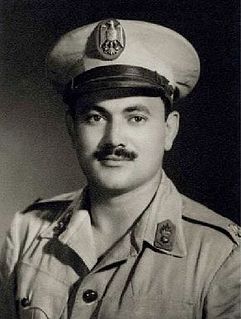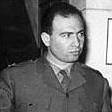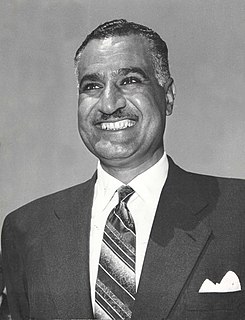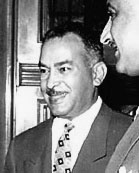 W
WHikmat Abu Zayd was an Egyptian politician and academic. She became the first female cabinet minister in Egypt in 1962. Her tenure as minister of social affairs set a precedent. Afterwards, it became common for women to head that ministry. An avowed advocate of Nasserism, Abu Zayd has had a major impact on Egyptian law and policy in the areas of social affairs and insurance.
 W
WAbdel Latif Boghdadi or Abd el-Latif el-Baghdadi was an Egyptian politician, senior air force officer, and judge. An original member of the Free Officers Movement which overthrew the monarchy in Egypt in the 1952 Revolution, Boghdadi later served as Gamal Abdel Nasser's vice president. The French author Jean Lacouture called Boghdadi "a robust manager" who only lacked "stature comparable to Nasser's." The two leaders had a fallout over Nasser's increasingly socialist and pro-USSR policies and Boghdadi subsequently withdrew from political life in 1964, although he mended ties with Nasser before the latter's death in 1970.
 W
WDiaa al-Din Dawoud was an Egyptian politician and activist. He is the founder of the Arab Democratic Nasserist Party, serving as its secretary-general between 1992 and November 2010.
 W
WMahmoud Fawzi was an Egyptian diplomat and political figure who was Prime Minister of Egypt from 1970 to 1972 and the vice president of Egypt from 1972 to 1974.
 W
WMohamed Hassanein Heikal was an Egyptian journalist. For 17 years (1957–1974), he was editor-in-chief of the Cairo newspaper Al-Ahram and was a commentator on Arab affairs for more than 50 years.
 W
WKamal El-Din Hussein was a member of the Egyptian Free Officers who overthrew King Farouk.
 W
WMustafa Khalil was an Egyptian politician and Prime Minister of Egypt from October 2, 1978 to May 15, 1980. Khalil also served as the Egyptian Foreign Minister from February 17, 1979 until May 15, 1980 upon the resignation of the position's incumbent over objections on peace talks between Egypt and Israel. Khalil was best known for his integral role in the negotiations that led to the 1979 Camp David Accord peace treaty between Egypt and Israel.
 W
WKhaled Mohieddine was an Egyptian revolutionary, politician, and military officer. As a member of the Free Officers Movement, he participated in the toppling of King Farouk that began the Egyptian Revolution of 1952, and led to the establishment of the Republic of Egypt.
 W
WZakaria Mohieddin was an Egyptian military officer, politician, Prime Minister of Egypt and head of the first Intelligence body in Egypt, the Egyptian General Intelligence Directorate.
 W
WGamal Abdel Nasser Hussein was an Egyptian politician who served as the second president of Egypt from 1954 until his death in 1970. Nasser led the 1952 overthrow of the monarchy and introduced far-reaching land reforms the following year. Following a 1954 attempt on his life by a Muslim Brotherhood member, he cracked down on the organization, put President Mohamed Naguib under house arrest and assumed executive office. He was formally elected president in June 1956.
 W
WAli Sabri was an Egyptian politician of Turkish origin.
 W
WMuhammad Anwar el-Sadat was an Egyptian politician who served as the third president of Egypt, from 15 October 1970 until his assassination by fundamentalist army officers on 6 October 1981. Sadat was a senior member of the Free Officers who overthrew King Farouk in the Egyptian Revolution of 1952, and a close confidant of President Gamal Abdel Nasser, under whom he served as Vice President twice and whom he succeeded as president in 1970. In 1978, Sadat and Menachem Begin, Prime Minister of Israel, signed a peace treaty in cooperation with United States President Jimmy Carter, for which they were recognized with the Nobel Peace Prize.
 W
WAbdel Hamid Sarraj was a Syrian Army officer and political figure in the mid-20th century.
 W
WAziz Sedky was an Egyptian politician and engineer. Sedky served as the Prime Minister of Egypt from 16 January 1972 until 26 March 1973. He was nicknamed the "father of Egyptian industry."
 W
WHussein Mahmoud Hassan el-Shafei, also known as Hussein el-Shafei, was a member of Egypt's 1952 revolutionary leadership council and served as vice president under two Egyptian presidents, Gamal Abdel Nasser and Anwar Sadat. He was one of the nine men who had constituted themselves as the committee of the Free Officers Movement, led the country's cavalry corps during the uprising and was one of only three living members of the Revolutionary Command Council at the time of his death.
 W
WMohamed Sedki Sulayman was an Egyptian politician and Prime Minister of Egypt from 10 September 1966 to 19 June 1967.